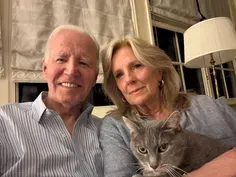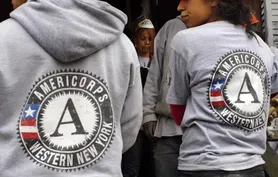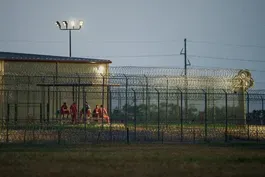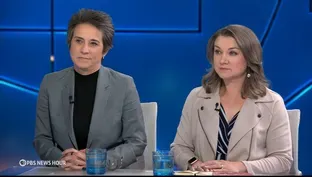
What tariffs mean for the everyday products we rely on
Clip: 5/19/2025 | 8m 1sVideo has Closed Captions
What Trump's tariffs mean for the everyday products we rely on
Nearly one out of every three physical products made in the world today comes from China, including many items we use in our daily lives. Economics correspondent Paul Solman invites us into his home for a look at what tariff turbulence means for the products we rely on.
Problems with Closed Captions? Closed Captioning Feedback
Problems with Closed Captions? Closed Captioning Feedback
Major corporate funding for the PBS News Hour is provided by BDO, BNSF, Consumer Cellular, American Cruise Lines, and Raymond James. Funding for the PBS NewsHour Weekend is provided by...

What tariffs mean for the everyday products we rely on
Clip: 5/19/2025 | 8m 1sVideo has Closed Captions
Nearly one out of every three physical products made in the world today comes from China, including many items we use in our daily lives. Economics correspondent Paul Solman invites us into his home for a look at what tariff turbulence means for the products we rely on.
Problems with Closed Captions? Closed Captioning Feedback
How to Watch PBS News Hour
PBS News Hour is available to stream on pbs.org and the free PBS App, available on iPhone, Apple TV, Android TV, Android smartphones, Amazon Fire TV, Amazon Fire Tablet, Roku, Samsung Smart TV, and Vizio.
Providing Support for PBS.org
Learn Moreabout PBS online sponsorshipGEOFF BENNETT: As we just heard, tariffs are one piece of the broader economic uncertainty, and that includes what Americans import from China.
Nearly one in every three physical products made in the world today comes from China, including most of what we use in our daily lives.
Tonight, economics correspondent Paul Solman invites us into his home for a look at what tariff turbulence means for the products we rely upon.
PAUL SOLMAN: Remember these ships stranded off the Los Angeles coast laden with Asian goods not long after COVID hit, and the consumption rush was on?
Well, here's that same port last week, not only no Chinese ships because of the Trump tariffs, but some had reportedly dumped cargo overboard, cheaper than bringing it back to Asia, ships slated to come in May 10 not even on the horizon.
So, a disaster for American consumers, right?
One scoop or two?
DANIEL BERGSTRESSER, Brandeis University: Two scoops.
PAUL SOLMAN: I invited economist Dan Bergstresser to my house, serving some hospitable morning joe, for him to demonstrate what some had feared would be imminent devastation.
He promised to show me just how much of a typical American's goods, in this case mine and my wife's, comes on those ships.
DANIEL BERGSTRESSER: Where was that scooper made?
PAUL SOLMAN: Hold on.
I will find out.
Scooper made in China.
DANIEL BERGSTRESSER: Made in China?
PAUL SOLMAN: Yes, made in China.
DANIEL BERGSTRESSER: I don't want you to burn yourself looking, but it's very likely that that was also manufactured in China.
PAUL SOLMAN: Let me check it.
I'm a little old for this, but, yes, made in China.
DANIEL BERGSTRESSER: Now these mugs, where are they made?
PAUL SOLMAN: Yes, made in China.
As we looked around my kitchen, the toaster.
DANIEL BERGSTRESSER: Toaster very likely to be made in China.
PAUL SOLMAN: Yes, we looked it up, Oster made in China.
A blender?
This mixer, we looked this up too.
This is made in China.
Indoor-outdoor thermometer.
Made in China.
The lights used to shoot this very story.
Dan, cameraman, where do they come from?
MAN: They come from China.
PAUL SOLMAN: So the typical American consumer is now going to be screwed?
DANIEL BERGSTRESSER: I think people are in for some surprises as the disruptions in trade kind of work their way through the various supply chains that we rely upon.
PAUL SOLMAN: And even if something wasn't made in China, it sure wasn't just made in America,my air conditioning compressor, for example.
So this is Carrier in Syracuse, New York, manufactured in the U.S. from domestic and foreign parts.
DANIEL BERGSTRESSER, Brandeis University: Your satisfaction with the experience of using a product is determined by everything kind of has to work, right?
If your -- if just one piece of your air conditioner, just one piece of an airplane that you're flying on doesn't work, you're going to have a very unsatisfying experience.
PAUL SOLMAN: Or a disastrous one.
We depend on goods or parts from China.
And even though a deal has now been struck, it takes containers 30 days from Shanghai to L.A., 45 to New York.
So bare shelves for that long, kids and grandkids bereft come Christmas if toys from Asia fail to arrive early enough?
No big deal, said President Trump, before the thaw with China.
DONALD TRUMP, President of the United States: Maybe the children will have two dolls, instead of 30 dolls, you know?
And maybe the two dolls will cost a couple of bucks more than they would normally.
PAUL SOLMAN: Isn't the president right that we just have too much stuff?
I sure as heck have too many mugs.
So if we have less stuff, we aren't really that much worse off.
DANIEL BERGSTRESSER: For example, we have a lot of mugs in this house.
Maybe we could have one fewer mug.
PAUL SOLMAN: Oh, we could have 15 fewer mugs.
DANIEL BERGSTRESSER: Fifteen fewer mugs.
PAUL SOLMAN: There are ones that are hidden in some box somewhere, believe me.
DANIEL BERGSTRESSER: But, as economists, we think that the consumer knows a lot about what they want.
And if you want 15 mugs, that is a thing we should celebrate.
PAUL SOLMAN: But even if I went haywire and wanted 15 more mugs, why couldn't they be made in this country?
Why can't America, given the size of the country, the number of people we have here, the advanced technology that we have here, why can't we go it alone?
DANIEL BERGSTRESSER: First of all, let's suppose that you are a capitalist.
You are thinking about building a mug factory in the United States.
You're going to spend $100 million to invest in that factory.
Your investors are going to insist on a return.
No thoughtful investor is going to be keen to build a mug factory on the promise of trade policy that could change tomorrow.
He's basically frozen the American investor, because all they see is policy that is -- it's very hard to get your hands around where things are going to be in a year.
PAUL SOLMAN: OK, back to the question that spurred this story.
With far fewer Chinese boats coming here, are we or aren't we about to experience empty shelves, going without?
Well, the workers rebuilding our rotting back deck told us their costs, and thus ours, are up maybe 20 percent.
General contractor Vito Montillo across the street agreed.
VITO MONTILLO, Montillo Construction: They have gone up a little bit.
I haven't - - I noticed a lot gone up.
PAUL SOLMAN: What percent?
VITO MONTILLO: Suppliers have e-mailed us saying that they have gone up between 10 and 30 percent.
PAUL SOLMAN: At the nearby Home Depot, there was some evidence of price increases.
MAN: This is seven bucks.
Seven bucks is actually expensive.
PAUL SOLMAN: And some things are definitely pricier, like high-efficiency windows from Europe.
MAN: A hundred percent, double the price.
PAUL SOLMAN: Really?
But when we went inside Home Depot, no shortage in sight, goods galore and aisle after aisle after aisle, and a worker there confided, loads of stuff piled up back of the store.
Prices?
Most people outside saw a little difference.
Was this much more expensive than you thought it was going to be?
MAN: No.
PAUL SOLMAN: Does it seem like it was more expensive than you thought?
MAN: Yes, maybe a little bit.
PAUL SOLMAN: So, why no crisis?
VITO MONTILLO: It's more speculation than anything.
PAUL SOLMAN: Really?
VITO MONTILLO: Yes, honestly.
PAUL SOLMAN: So, because they're anticipating the effects... VITO MONTILLO: I think -- yes, I think that's what it is.
I think they're anticipating prices going up, but we haven't actually witnessed any prices really, really going up.
PAUL SOLMAN: That is, expecting the tariffs, stores and people and even I have been stocking up, so a surge of imports to beat the tariffs, which has bid up prices, not for the most part actual shortages.
And with excess inventory and the president now pausing tariffs right and left, enough inventory it may be to tide us over.
So not to worry?
Wells, says economist Bergstresser, even if the tariff threats turn out to have been just that: DANIEL BERGSTRESSER: The larger problem is one of uncertainty.
You can say you're pausing the implementation of these tariffs for 90 days.
What happens in 90 days?
The Trump administration has not developed a reputation for credibility in terms of honoring the types of commitments that your trading partners and investors would count on before making investments.
And so I think people who think that there's clarity around the corner misjudge our president.
PAUL SOLMAN: In the meantime, suppliers are again hustling to import stuff from China ahead of the new 90-day deadline.
That's probably because uncertainty remains the word of the moment.
And Walmart just announced that prices of its imports may well be going up within the month.
For the "PBS News Hour," Paul Solman at home.
After Biden's diagnosis, a look at prostate cancer's impact
Video has Closed Captions
Clip: 5/19/2025 | 4m 58s | After Biden's diagnosis, a look at prostate cancer's impact on men in the U.S. (4m 58s)
Artist explores her Haitian heritage for inspiration
Video has Closed Captions
Clip: 5/19/2025 | 5m 13s | Artist Fabiola Jean-Louis explores her Haitian heritage for inspiration (5m 13s)
Credit rating downgrade triggers warning signs for U.S.
Video has Closed Captions
Clip: 5/19/2025 | 4m 57s | Credit rating downgrade triggers warning signs for U.S. economy (4m 57s)
How cuts have hit nonprofits and the communities they serve
Video has Closed Captions
Clip: 5/19/2025 | 7m 22s | How federal funding cuts have hit nonprofits and the communities they serve (7m 22s)
Israel allows some aid into Gaza as it intensifies strikes
Video has Closed Captions
Clip: 5/19/2025 | 5m 29s | Israel allows 'minimal aid' into Gaza as it intensifies airstrikes and ground operations (5m 29s)
News Wrap: Trump may end protected status for Venezuelans
Video has Closed Captions
Clip: 5/19/2025 | 6m 28s | News Wrap: Supreme Court allows Trump to end temporary protected status for Venezuelans (6m 28s)
Tamara Keith and Amy Walter on Trump's 'big, beautiful bill'
Video has Closed Captions
Clip: 5/19/2025 | 9m 17s | Tamara Keith and Amy Walter on the battle over Trump's 'big, beautiful bill' (9m 17s)
Providing Support for PBS.org
Learn Moreabout PBS online sponsorshipSupport for PBS provided by:
Major corporate funding for the PBS News Hour is provided by BDO, BNSF, Consumer Cellular, American Cruise Lines, and Raymond James. Funding for the PBS NewsHour Weekend is provided by...


















